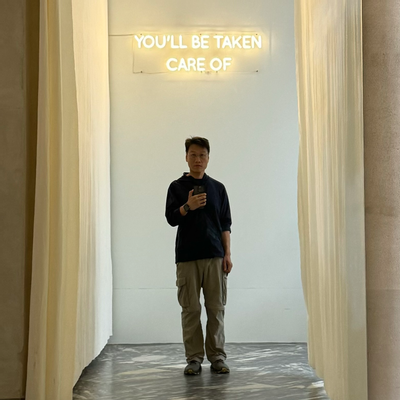If our education curriculum includes compassion, perhaps it could be more beneficial to society than Mandarin, math, or calculus.
Mercy. Mercy. Mercy.
He is first an individual, and then a migrant worker.Lucky to participate in the Taiwan Southern Image Association's "Hometown Documentary Hand Documentary Training Class" and meet the esteemed director Tsai Tsung-lung. During the class, the director's film "And Miles to Go Before I Sleep" was screened. I was fortunate to see this masterpiece. "Profound", might be the only word came up to me after the movie.
I probably don't have the courage to watch it again, but it remains deeply in my heart.
The pain in my heart is hard to express. Even though I write or draw to convey it, the images still occasionally surface. I feel that something should be left for these people. Although my strength is limited, as long as one more person sees it, it may make one more person remember Ngân Li Do , and perhaps make one more person rethink compassion.
I'll share the documentary trailer as below, but the scenes are truly heart-wrenching, please consider before watching!
Please consider before watching!
Please consider before watching! (But it does worth!)
In case you're not ready to watch this masterpiece, there will be a textual description of the events below.
The Story.
- It would be a single event, so I use a term of proper noun.
Ngân Li Do (1990-2017), a Vietnamese youth who loved singing, came to Taiwan in 2014 like many fellow ambitious youths, with hopes, courage, and enthusiasm, expecting to earn money to improve his family's situation and support his parents and siblings.
A simple path turned into an uneven life. In the toil of repaying debts to return home in dignity as a "runaway migrant worker," he faced the tragic end. Unexpectedly, one day in 2017, he was reported for attempting to steal a car by a secluded river.
The police shouted at him to "get down."
He did not comply, picked up small stones and threw them towards the police, tried to open the police car door, and was shot nine times. Even after being shot, he struggled to crawl under the car or pick up small stones, and the police, perceiving him as aggressive, delayed sending him to the hospital, resulting in his death.
Maybe straightforward, perhaps that's a story for us.
But if I were in the shoes of a foreign migrant worker, is it possible that I wouldn't understand the command "get down"?
Is it possible that my instinctive grabbing of nearby objects is due to nervousness, instinct, and self-defense, given that a police officer with a language barrier is pointing a gun at me?
I don't know. I really don't know.
Maybe the police at the scene didn't know either, they didn't expect it, because their training might not include these assumptions, SOPs ahead(commands, pepper spray, defensive shooting).
Is it possible that if there were more training in compassion and empathy in the training of becoming a police officer, this officer would have a second thought before firing?
I don't know, it's just my speculation. Not close enough to the facts, I can't comment lightly, I can only imagine from different perspectives.
Hence, even more respect to the director, spending years investigating and arresting secret recordings, interviewing victims' families, finding reports of occupational injuries to migrant workers over the years, but still unable to judge, only leaving a sentence, "Did those nine bullets really kill him?" for the audience to ponder.
Respect to the director and producers.
九槍 And Miles to Go Before I Sleep
"Public opinion supports law enforcement on one side, but a series of mysteries unfold after the incident. Why would a rookie police officer fire nine shots at a naked migrant worker? Before the shots rang out, what forces compelled him to become a runaway migrant worker, living a life as fragile as a weed? Did those nine bullets really kill him?"
Realize more about this boy (1990-):
The director has opened a memorial Facebook for Ngân Li Do:
If you're willing, go and see his words, his creations, his music, he's really like our children, our brothers. Why shouldn't he be understood because of his identity?
In addition to the Ngân Li Do incident, Director Tsai reviews the experiences of many migrant workers in the documentary, including falling from a bridge to escape police investigation at a factory (still deported, but fortunate), being abused to death on a fishing boat, and perishing in a fire in a shabby metal dormitory.
Here, it's just a microcosm, the same scenarios are happening in corners of the world.
Events have no good or bad, right or wrong, only different perspectives. What would this world be like if there were no binary opposition?
Thank you for patiently reading ─ perhaps for you, this is just the beginning.
If you're willing, start paying attention to the migrant worker issue, below are recommended articles and non-profit organizations to understand:
Appreciate and respect to migrant workers, you can have a look:
- Ways To Thank A Migrant Worker On Labour Day
- Non-profit organization focusing on Southeast Asian migrant worker education: one-forty.org
如果有一天,我在人生的路上跌倒了,媽媽,請原諒我。 __阮國非
If one day, I fall on the road of life, mom, please forgive me. __Ngân Li Do
Nèu môt mai trên đưông đôi văp ngă ? Xin me hiên hăy thư lôi cho con! __Ngân Li Do


























